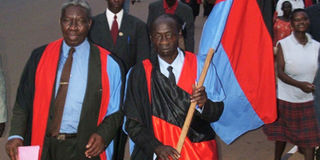Mugwisa: UPC rock in Buganda

Mugwisa (L) marches with other UPC members ahead of the party’s conference before he died. PHOTO by S. Wandera.
What you need to know:
Lost cancer battle. Mugwisa, one of UPC’s founder members, died of prostrate cancer at International Hospital Kampala at the weekend.
Kampala
“When an old person dies, a library goes with him to the grave,” so the old saying goes. This is how Uganda Peoples Congress’ vice president Joseph Bbossa described former minister of agriculture, Samwiri Mugwisa, who passed on at the weekend. “He was a moving library on Uganda’s political history, and as a party, we have lost one of the pillars of the party, he has been there for the party from its inception,” Mr Bbossa said.
Mugwisa lost the battle to prostate cancer last Saturday at International Hospital Kampala at the age of 82. He was laid to rest in Mityana yesterday.
According to Mr Henry Makmot, an erstwhile friend with whom they served in cabinet during the Obote II regime, Mugwisa had battled prostate cancer for four years. “He had been discharged from Norvik Hospital where he had been undergoing treatment. But he developed complications and was rushed to IHK where he was admitted for a day before he passed away,” Mr Makmot said of his friend’s last days.
Rise to prominence
Though a founding member of UPC, Mugwisa did not take to mainstream politics until 1966 when Obote created four new districts in Buganda, East Mengo, West Mengo, Mubende and Masaka.
He was appointed UPC’s assistant secretary general for Mubende District until 1971 when Amin overthrew Obote. After the coup, Mugwisa left his home in Mityana for Mubende where he sought the protection of the commandant of the tiger barracks, a one Col Obura.
Unfortunately, Obura too was on the run and sought Mugwisa’s help to locate the way to Gulu without having to go through Kampala since the forces they were running from came from Kampala direction. The two, however, drove to Kampala through Ntwetwe, Kakumiro, and Kiboga.
Mugwisa hid his wife and children at his auntie’s home in Nansana before going to hide at Edward Mugalu’s place, a business friend who lived in Mpererwe. Feeling unsafe, he continued to Kansanga, and sheltered at former Kampala mayor Ssebaana Kizito’s place, his childhood friend. It was from here that he managed to flee the country and started a new life in exile.
While in exile
Outside politics, Mugwisa was a businessman exporting produce. When he fled into exile, he opened a branch of Maco International in Nairobi, the company where he was a co-director in Uganda. In exile, he exported sisal sacks to Uganda, salted fish from Kenya to Zaire now [DR Congo] while importing produce from Uganda to Kenya. While in Nairobi, Mugwisa teamed up with another political exile, Henry Semukutu to export cotton seed cake from Tanzania to Denmark.
During a business trip to New York in 1978, Mugwisa met former president Godfrey Binaisa who introduced him to Andrew Kayira who had formed Uganda Federal Union to fight Amin.
When he returned to Nairobi in January 1979, the war against Amin had gained momentum and he was invited by Paulo Muwanga to Dar es Salaam to join him since he was the only Muganda there. Mugwisa was joined by Edward Rurangaranga, Chris Rwakasisi, Christopher Sebuliba and Francis Kizito, on a journey from Nairobi to Msasani Bay in Dar es Salaam where Obote was staying.
Fighting Amin
At Msasani Bay, Mugwisa was put under brigade 208 of the Tanzanian liberating forces as a political commissioner for Masaka axis reporting to Gen David Msuguri. When he crossed into Uganda, he started mobilising using the local drum beat of Gwanga Mujje for meetings to sensitise them about the war against Amin.
However, his stay at the frontline was short lived as he was recalled back to Dar es Salaam after the Moshi conference. He was taken to Police Officers’ Mess in Dar es Salaam where he met the president in the waiting Yusuf Lule who handed him an appointment letter as the district commissioner in charge of Masaka.
When Kampala fell in April 1979, Mugwisa was asked to announce the fall of Amin but he feared. “I was scared of what that would mean to the fighting forces of Tito Okello and group,” he told Sunday Monitor last year during an interview for the Road to Exile series.
He did not join cabinet until the fall of Lule when Binaisa appointed him deputy minister of agriculture. The Military Commission headed by Paulo Muwanga later promoted him to full minister.
Mugwisa stood on a UPC ticket in Mubende North East during the 1980 election, and Obote maintained him as a minister until 1985 when his government fell.
After the coup, Mugwisa was arrested in November 1986, and sent to Luzira for six months on charges of kidnap and murder. However, he was later found innocent and he returned to private life doing export business mainly in produces.
By the time of his death, Mugwisa was the vice chairman of UPC Buganda region, and one of the few surviving founder members of the party.




